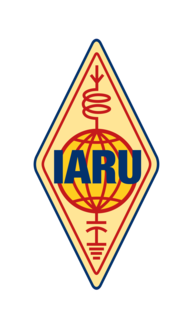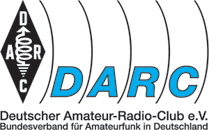
The International Amateur Radio Union (IARU) is an international confederation of national organisations that allows a forum for common matters of concern to amateur radio operators worldwide, and collectively represents matters to the International Telecommunication Union (ITU). The International Amateur Radio Union was founded in 1925 and, as of July 2021, it is composed of 173 national member societies.

The Deutscher Amateur Radio Club e.V. (DARC) is a national non-profit organization for amateur radio enthusiasts in Germany. As of 9 July 2019, the organization had 34,009 members, approximately 53% of all licensed amateur radio operators in Germany. Key membership benefits of the organization include QSL bureau services, a monthly membership magazine called CQ DL, and the promotion and sponsorship of radio contests. DARC promotes amateur radio by organizing classes and technical support to help enthusiasts earn their amateur radio license. The DARC also represents the interests of German amateur radio operators and shortwave listeners before German and international telecommunications regulatory authorities. DARC is the national member society representing Germany in the International Amateur Radio Union.
The Réseau des Émetteurs Français (REF) is a national non-profit organization for amateur radio enthusiasts in France. Key membership benefits of the organization include QSL bureau services, a monthly membership magazine called Radio REF, and the promotion and sponsorship of radio contests and operating awards. REF promotes amateur radio by organizing classes and technical support to help enthusiasts earn their amateur radio license. The REF-Union also represents the interests of French amateur radio operators and shortwave listeners before French and international telecommunications regulatory authorities. REF is the national member society representing France in the International Amateur Radio Union.
The Federacion Mexicana de Radio Experimentadores, A.C. (FMRE) is a national non-profit organization for amateur radio enthusiasts in Mexico. Key membership benefits of the organization include QSL bureau services, the promotion and sponsorship of radio contests and operating awards, and an organization dedicated to emergency communications. FMRE promotes amateur radio by organizing classes and technical support to help enthusiasts earn their amateur radio license. Members receive a bimonthly magazine published by the organization, Onda corta. The FMRE also represents the interests of Mexican amateur radio operators before Mexican and international telecommunications regulatory authorities. FMRE is the national member society representing Mexico in the International Amateur Radio Union.
The Radio Amateur Society of Thailand (RAST) is a national non-profit organization for amateur radio enthusiasts in Thailand. The organization is founded under the royal patronage of the King of Thailand, and qualifies as a charitable entity pursuant to a Thai Ministry of Finance declaration. The organization was founded on August 22, 1963 by a group of amateur radio operators who met at a restaurant in Bangkok. Among the first orders of business was to address official objections to the communications of radio amateurs in Thailand with amateur radio operators in other countries. The RAST represents the interests of Thai amateur radio operators and shortwave listeners before Thai and international telecommunications regulatory authorities. RAST is the national member society representing Thailand in the International Amateur Radio Union.
The Unión de Radioaficionados Españoles (URE) is a national non-profit organization for amateur radio enthusiasts in Spain. The organization has approximately 8,000 members, predominantly amateur radio operators in Spain. URE promotes amateur radio by sponsoring amateur radio operating awards and radio contests. The URE also represents the interests of Spanish amateur radio operators and shortwave listeners before Spanish and international telecommunications regulatory authorities. URE is the national member society representing Spain in the International Amateur Radio Union.
The Russian Amateur Radio Union is a national non-profit organization for amateur radio enthusiasts in Russia. The organization often uses SRR as its official abbreviation, based on the standard Romanization of the Russian name. The organization was founded in 1992.
The Associazione Radioamatori Italiani is a national non-profit organization for amateur radio enthusiasts in Italy.

The Radio Club Argentino (RCA) is a national non-profit organization for amateur radio enthusiasts in Argentina. RCA was founded in Buenos Aires on October 21, 1921. Key membership benefits in the organization include the use of a QSL bureau for those amateur radio operators in regular contact with amateur radio operators in other countries, a group insurance policy, and a quarterly membership journal called Revista del Radio Club Argentino. The Radio Club Argentino represents the interests of Argentine amateur radio operators before Argentine and international regulatory authorities. It is also the national member society representing Argentina in the International Amateur Radio Union.
The Suomen Radioamatööriliitto (SRAL) is a national non-profit organization for amateur radio enthusiasts in Finland. SRAL was founded in 1921 and has approximately 5,000 members. SRAL supports amateur radio operators in Finland by sponsoring amateur radio operating awards and radio contests. SRAL was one of the sponsor organizations for the 2002 World Radiosport Team Championships held near Helsinki. The SRAL also represents the interests of Finnish amateur radio operators and shortwave listeners before Finnish and international telecommunications regulatory authorities. SRAL is the national member society representing Finland in the International Amateur Radio Union.
The Österreichischer Versuchssenderverband (ÖVSV) is a national non-profit organization for amateur radio enthusiasts in Austria. Key membership benefits of the ÖVSV include the sponsorship of amateur radio operating awards, radio contests, and a QSL bureau for members who regularly communicate with amateur radio operators in other countries. ÖVSV represents the interests of Austrian amateur radio operators before Austrian and international telecommunications regulatory authorities.
The Eesti Raadioamatööride Ühing (ERAU) is a national non-profit organization for amateur radio enthusiasts in Estonia. Key membership benefits of ERAU include the sponsorship of amateur radio operating awards and radio contests, and a QSL bureau for those members who regularly communicate with amateur radio operators in other countries. ERAU publishes a semi-annual membership magazine called ES-QTC. ERAU represents the interests of Estonian amateur radio operators before Estonian and international telecommunications regulatory authorities. ERAU is the national member society representing Estonia in the International Amateur Radio Union.
Asociația Radioamatorilor din Moldova (ARM) is a national non-profit organization for amateur radio enthusiasts in Moldova. Key membership benefits of ARM include the sponsorship of amateur radio operating awards and radio contests, and a QSL bureau for those members who regularly communicate with amateur radio operators in other countries. ARM represents the interests of Moldovan amateur radio operators before Moldovan, European, and international telecommunications regulatory authorities. ARM is the national member society representing Moldova in the International Amateur Radio Union.
The Radio Club Uruguayo (RCU) is a national non-profit organization for amateur radio enthusiasts in Uruguay. RCU was founded on August 23, 1933. The RCU operates a QSL bureau for those amateur radio operators in regular contact with amateur radio operators in other countries. Radio Club Uruguayo represents the interests of their associated amateur radio operators in Uruguay before national and international regulatory authorities. RCU is the national member society representing Uruguay in the International Amateur Radio Union.
The Radio Club Peruano (RCP) is a national non-profit organization for amateur radio enthusiasts in Peru. RCP was founded on December 6, 1930 and the first General Meeting of the organization was held in the halls of the Library of the Geographical Society in Lima, Peru in January, 1931. The RCP operates a QSL bureau for those amateur radio operators in regular contact with amateur radio operators in other countries, and supports amateur radio operating awards and radio contests. Radio Club Peruano represents the interests of Peruvian amateur radio operators before national and international regulatory authorities. RCP is the national member society representing Peru in the International Amateur Radio Union.
The Pakistan Amateur Radio Society (PARS) is a national non-profit organization for amateur radio enthusiasts in Pakistan. It operates a QSL bureau for those amateur radio operators in regular contact with amateur radio operators in other countries, and supports amateur radio operating awards and radio contests. It represents the interests of Pakistani amateur radio operators before national and international regulatory authorities. PARS is the national member society representing Pakistan in the International Amateur Radio Union.
The Club de Radioaficionados de Guatemala (CRAG) is a national non-profit organization for amateur radio enthusiasts in Guatemala. Key membership benefits of the CRAG include a QSL bureau for those amateur radio operators in regular communications with other amateur radio operators in foreign countries, and a network to support amateur radio emergency communications. CRAG represents the interests of Guatemalan amateur radio operators before Guatemalan and international regulatory authorities. CRAG is the national member society representing Guatemala in the International Amateur Radio Union.

The Club de Radio Aficionados de El Salvador (CRAS) is a national non-profit organization for amateur radio enthusiasts in El Salvador. Key membership benefits of the CRAS include a QSL bureau for those amateur radio operators in regular communications with other amateur radio operators in foreign countries, and a network to support amateur radio emergency communications. CRAS represents the interests of El Salvadoran amateur radio operators before El Salvadoran and international regulatory authorities. CRAS is the national member society representing El Salvador in the International Amateur Radio Union.
The Lesotho Amateur Radio Society (LARS) is a national non-profit organization for amateur radio enthusiasts in Lesotho. LARS operates a QSL bureau for those members who regularly communicate with amateur radio operators in other countries, and offers radio equipment to its members for their use. LARS represents the interests of Lesotho amateur radio operators and shortwave listeners before Lesotho and international telecommunications regulatory authorities. LARS is the national member society representing Lesotho in the International Amateur Radio Union.
The Mauritius Amateur Radio Society (MARS) is a national non-profit organization for amateur radio enthusiasts in Mauritius. The organization was founded in 1968 by a group of native Mauritians and British expatriates. The Society applied to join the International Amateur Radio Union on March 12, 1968, the day that Mauritius gained independence from Great Britain. MARS operates a QSL bureau for those members who regularly communicate with amateur radio operators in other countries, and offers radio equipment to its members for their use. MARS represents the interests of the amateur radio operators and shortwave listeners of Mauritius before national and international telecommunications regulatory authorities. MARS is the national member society representing Mauritius in the International Amateur Radio Union.




